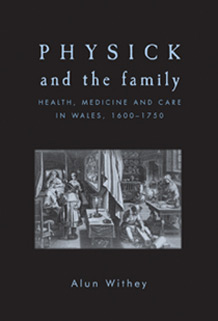
Front bookcover
Welsh medical history research wins European book award
A medical history book focusing on the experience of illness, medicine and care in 17th century Wales has won a major European prize.
University of Exeter historian, Dr Alun Withey’s book ‘Physick and the Family’ was awarded the biennial European Association for the History of Medicine and Health (EAHMH) 2013 Book Prize, for the best medical history monograph published in the past four years.
Dr Withey is an expert on early modern medicine and his research explores everything from medical remedies and diseases to practitioners and surgery. At present he is currently engaged in a search for early modern Welsh practitioners, looking for evidence of who they were, where they practised and what they did, from large towns such as Cardiff and Wrexham to rural areas.
His book brings to life health and care, medical knowledge and its consumption, reproduction and circulation among a population where the spoken word, rather than a written culture of knowledge dominated. It explores who was responsible for caring for the sick, both in the home and the community, and how well-equipped the early modern household was to prepare their own medicines. It also delves into the ways people obtained and spread medical knowledge over 150 years, the impact of literacy and how this was further affected by a language barrier between English and Welsh.
What stood out most to the EAHMH jury was Dr Withey’s approach of exploring ordinary people’s experience of sickness and healing, their perception of illness, how they reacted to it and how they experimented with the ‘sick role’. One of the jurors said: “it offers new directions for recovering the often obscure medical worldview of the ‘ordinary’ person.” It was also noted that although Dr Withey researched a place and era which lacked institutions to produce trained health professionals or provide health and poor relief resources, he was able to enter into people’s houses, follow their caring routines, accompany them as they accessed their social networks, while simultaneously uncovering their rules and dynamics and the way they mixed tradition with modernity.
International recognition for this kind of medical history is important in highlighting the provision of medical support outside of hospitals and institutions. Dr Withey said: “I’m absolutely delighted to have been awarded this prestigious prize. The book was written not only to bridge a gap in Welsh history, but to use Welsh sources to address much broader issues in the history of medicine. Hopefully this award means that it has achieved its aims.”
The winning book was also called “an original contribution to the social history of British medicine, and to the social history of early modern period in general.”
Date: 25 October 2013
